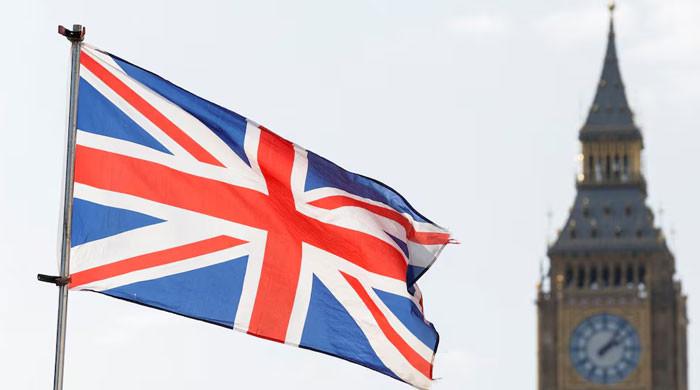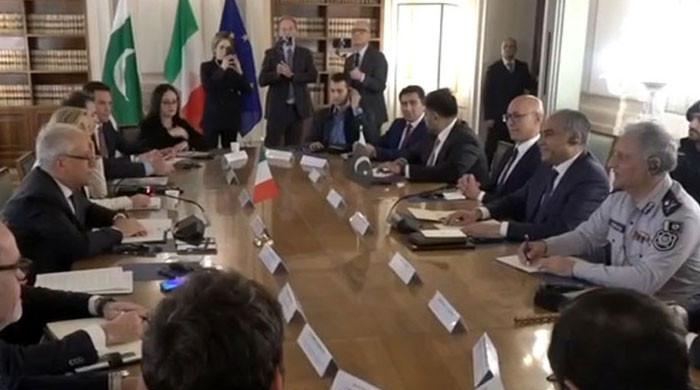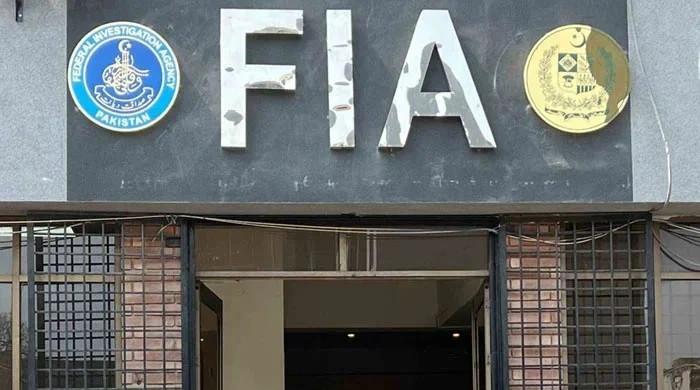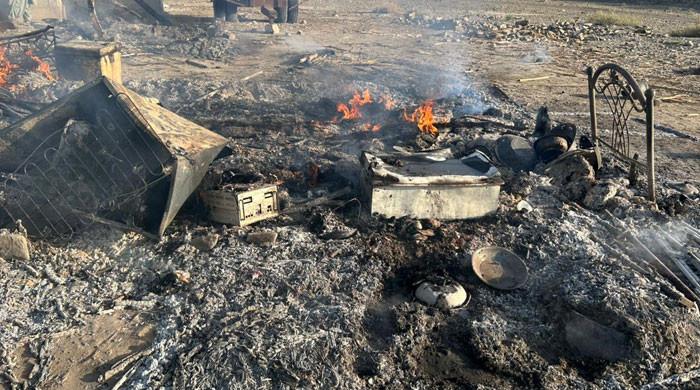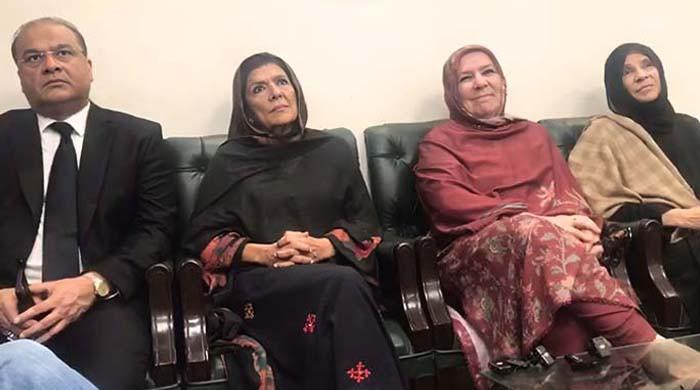Islamabad's young lad runs in elections to 'fix the broken system'
Hamza Haroon, a Harvard graduate, wants to empower youth and work on policies of the future
December 26, 2023

A young lad with ambition, Hamza Haroon, eyes changing the way Pakistanis see politicians, as he gears up to contest for a National Assembly seat in the general elections — slated to be staged on February 8, 2024.
The 33-year-old Harvard graduate, who has spent more than seven years in America’s corporate sector, finally packed up in 2020 and came back to Pakistan with the goal of serving his country — a chance that not many get.
In 2020, he was appointed as special adviser to the Minister of Science and Technology and later promoted to director of strategic initiatives to the minister. At the ministry, he led and worked on policy initiatives such as civilian drone policy, disruptive technologies, and electric vehicle policy.
His seemingly ideal situation makes one wonder about his motivations for entering the political arena, which isn't exactly known for its positive image.
“Short answer: our country is a sinking ship, run by incompetent career politicians; everyone wants to jump ship, but I believe that people like myself can come together, learn from the mistakes of the past, chart a sustainable course, and turn this sinking ship into a space ship,” Haroon told Geo.tv, who will be running for Islamabad’s NA-46 constituency.
Haroon says that running in elections isn’t something that he just planned, rather, there were many instances in his life that have motivated him to be where he is now.
“Since my childhood, like many citizens, I saw my father work very hard, many times at the expense of his family, in serving his country in the Pakistan Navy. I was also inspired by the sacrifices of the good men and women working for the betterment and security of our nation.”
The independent candidate says that his time in the US, working in the corporate sector, also showed him that life is boring if one is not pursuing their purpose.
Upon returning, Haroon said that he worked for the government as a technocratic adviser and at the Harvard Kennedy School motivated him to enter into politics and run for elections.
“I saw how sad the state of affairs was; how I felt the system did not work for the masses, and in Harvard I understood very clearly that ‘we’ make up the system, if the system is broken that means we are broken, and that if we want to change the system, people like us need to step in,” he says.
Motivation
The question: what’s the motivation for a person who has made a name for themselves abroad to come back and get into the political ring?
For this, Hamza says that the biggest motivation comes from meeting people of his constituency, who work very hard and yet fail to live up giving the growing pains of inflation, access to water, schools, healthcare, security, and basic necessities of life.
“I want to work for them, I want to serve through good policy, I want to create a system around them that works for them, that protects them and not the other way around, which is currently the case.”
“I want them to delete my number from their cell phones because they will never need it. Your so-called connections don’t matter, the system around them will work for them, I want them to never depend on anyone.”
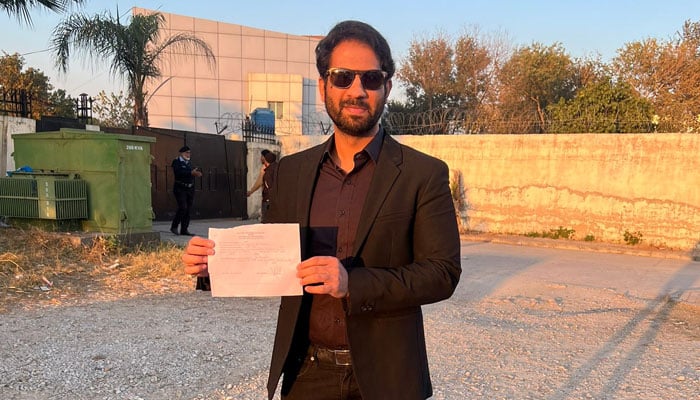
Hamza said he is motivated by the fact that people like “us” are constantly told to stay away from politics, our society believes that only the rich and the political dynasties are the ones fit for policy and law-making.
“I want to fight this, I want to run a principled campaign, a campaign that generates funds, increases leadership and ownership in the city, and encourages and inspires youth to pursue their dreams and have a voice in policy,” the Harvard graduate said.
“I am motivated to serve and hope to inspire the youth, who is marginalised, is used to chanting slogans and voting but that’s it, I want them to enter policy-making, become leaders, and be in charge of their future; the days of the babus, seths, and career politicians are over. Abh Islamabad nojaowan chaleya ga. Tadeeli ap sey hey, tabdeeli ap mey hai (Now the youth will run Islamabad. Change comes from you)!
Post-election plans?
The 33-year-old NA aspirant said his vision is clear if he gets elected.
“I want every young and old citizen of this city to be able to dream and achieve these dreams in their city so that they do not have to leave their loved ones. I believe all opportunities should be available to every citizen,” he said.
Hamza noted that there's something that is clear to him: I need to communicate better to people so they can differentiate what an MNA does versus what a mayor or a UC chairman does. MNA’s role is to make good policy not fix the sewerage line.
MNA needs to legislate and empower, so the sewerage line is fixed as soon as it's broken, that is my mission, he said, to create a process that works for the people.
Explaining his plans further, Hamza said there are three pillars for solidifying his vision — the youth will run Islamabad, an inclusive economy, and the safety of life, climate, and health.
Hamza said according to a Pakistan Institute of Development Economics (PIDE) study, the government footprint is almost 67% of the economy.
“We speak the language of a market economy, and we actually do quite the opposite. I want an economy that works for all, not the elites,” he noted.
Talking about ease of entrepreneurship and business, the 33-year-old said he wants the private sector to never have to see bureaucrats face or wait months on end for a lengthy NOC process that could have been an online application.
“To be honest, the entire ECP procedure I had to do for nomination papers could have been done online. Our current system demotivates investors, discourages entrepreneurs and is allergic to change,” he noted.
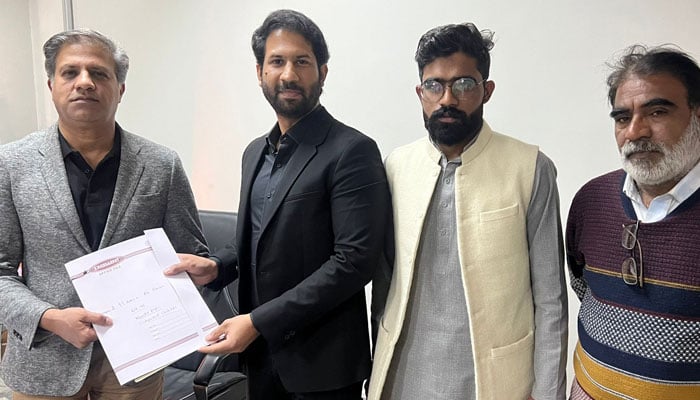
Hamza said he envisions Islamabad to become an export city, a climate resilient city, a city of entrepreneurs, a city of sports, gaming, entertainment and arts, a city with low-income housing that runs on renewables, everyone has access to cheap high-speed internet, online and offline vocational training that ensure good jobs, and has a solid public transport infrastructure catered for all citizens.
Talking more about his visions, he explained:
Specialised courts for swifter justice: Launch of online small claims courts, business courts, and consumer safety courts in Islamabad for swift, fair, and speedy justice for all. No more court kacheri key chakar.
Innovative healthcare: Rolling out mobile hospitals to rural areas, tele-health for all, and affordable senior living centres shared across sectors, creating senior living centres accessible to everyone.
Climate-resilient Islamabad: As the frontline state in the fight against climate change, Islamabad will become a model of sustainability with robust emission standards, renewable energy incentives, green urban planning, sustainable public transport, and innovative waste management. I want Islamabad to host a COP in the future, I also will move to establish a climate and AI research centre here in Islamabad.
Importance of independent candidates and plans to join a party
Speaking about why independent candidates should run in elections, he said frankly, there is no clear process to get into politics in Pakistan; we have made it so difficult to enter with high barriers to entry, so the current incompetent career politicians can keep guard.
“I remember, every time I tell people I’m running for elections, they ask me if I have 7-8 crores to spare or if my parents are politicians, this explains a lot that is wrong,” he explained.
It's crucial for independent candidates, particularly youth, to run in polls because they bring fresh perspectives and innovative solutions to the table, he said, noting that youth participation in politics challenges the status quo and the longstanding dominance of established parties.
Honestly, Hamza said, it would hopefully elevate the standard of our conversations.
Currently, the discourse is terrible, these career politicians have forgotten why they came into this profession, to serve the people and find sustainable solutions to their problems.
Independent candidates represent a direct line to the grassroots level or they give voice to communities and individuals who may feel marginalized by mainstream political discourse, Hamza said, adding that they offer new approaches to governance and policy-making.
Moving forward, Hamza said as an independent candidate, his primary allegiance is to the constituents and the values he’s campaigned on, rather than to a party's agenda.
“I don’t go around meeting my constituents, telling them about any leader of mine or force-feeding them solutions made in a room, I tell them they have the solutions to their problems and how I believe that we all need to be part of the solution.”
He noted that local problems require local solutions.
“Unlike my competition, I go around creating more leadership in the city rather than increasing the count of my followers.”
This independence, he said, allows for flexibility in evidence-based policy-making that has impact, unencumbered by party lines or spectrum, “which, by the way, none can decipher, all parties sound the same, to be honest”.
Hamza agreed that political parties can offer a platform and resources that are challenging to match as an independent. They provide a network of support and increased potential to influence legislation, he said.
“Joining a party could have a more significant impact, but only if the party's principles align closely with those of my constituents and myself. This will be a decision they will help me make; I represent the choices of my constituents.”
Thus, he said, his decision would be based on a careful evaluation of whether joining a party would enhance his ability to serve the constituents effectively and uphold the values he believes in.
“If a party demonstrates a genuine commitment to the issues that matter to us, they believe in transparency, accountability and fairness and elevating and empowering citizens, then it would be worth considering,” Hamza concluded.




